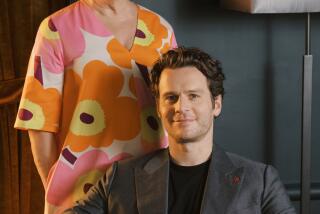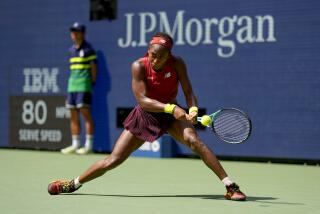Both on and Off Court, Graf Has Come a Long Way in Past Year
- Share via
NEW YORK — Peter Graf is a man with a tough reputation. He is the father, the coach and the creator of the world’s No. 1 female tennis player, Steffi Graf.
In that role he has developed a reputation in the tennis world as a hard-nosed businessman, a man with a temper, a demanding taskmaster.
But when he talks about his daughter, Peter Graf sounds like any doting father. His voice is soft, his blue eyes shine and his pride is evident. He sat this morning, sipping a cola after an early practice session, talking about Steffi’s social life.
“When she finds someone, he must be a tennis player or a sportsman I think,” he said. “If it is not, it will be difficult for him to understand her love of tennis.”
As the father talked, the daughter walked in, your basic 18-year-old. She wore faded blue jeans and a striped shirt. In one hand she carried sunglasses; in the other, an audio set. She was on her way into Manhattan to buy a birthday present for her brother, who recently turned 16.
“I’m taking him with me to choose,” she said, laughing. “It’s much easier that way.”
She sat down next to her father, who patted her on the knee affectionately. “No husband for you, right?” he said with a grin. “Not so long as I am your father.”
Steffi Graf rolled her eyes. “OK, I tell you what,” Peter Graf said. “You can have a husband . . . in the next life.”
Steffi Graf laughed, clearly comfortable when her father teases her. “He is the one who takes the pressure off me,” she said. “People do not get angry with me. They get angry with him.”
Both Grafs have come a long way, on and off court, in the last 12 months. It was here, at the U.S. Open last year, that Graf made it clear the days of domination by Martina Navratilova and Chris Evert were numbered.
Graf pushed Navratilova right to the brink in the semifinals, holding three match points before losing the riveting battle in a third-set tie breaker.
“After that match, everyone knew,” Pam Shriver said. “It was only a matter of time until Steffi took over. We knew it was going to happen; now it has. It will be interesting to see how both parties (Graf and Navratilova) react.”
Graf is watched closely by all of women’s tennis. She has been on the circuit since she was 13, and because she was shy and her father so protective, she developed a reputation for being aloof.
“Last year, one of the top players came to me and said, ‘Steffi never speaks to me,’ ” Peter Graf said. “I told her that she should be the one to go to Steffi, because Steffi is younger, so it is harder for her to go to the older ones.
“It is not easy for a young player when she comes into the top 10. Other players don’t like that. Now she is No. 1, so there will be some loneliness. It is that way with all champions.”
That has always been the case in men’s tennis but less so in women’s tennis, where Navratilova, Evert and Shriver have been friends almost from the start. But in this generation of team tennis--player, coach, parents, agent--there is less camaraderie.
Graf and Gabriela Sabatini, who are considered the next generation in the women’s game, play doubles together, but they are not close. Part of that is language--the German Graf’s command of English is much better than the Argentine Sabatini’s. Each has her “team” to go off with after a match, so socializing is rare.
“I’m not sure her father would let Steffi get close to another player,” Navratilova said. “I think she’s a really nice kid, but I’m the one who instigates most of our conversation. Part of that is certainly age, but the other day I was looking at her personality profile in the WITA (Women’s International Tennis Assn.) calendar and I realized we had a lot in common: same colors, same kind of music, home cooking, playing with our dogs.
“I was surprised. I thought, ‘Wow, we would probably get along well if we spent time together.’ But I doubt that we will.”
Even though she is not close to the other players, Graf has grown in stature as a person as she has grown as a player.
Last year, after the Navratilova match, the two passed each other in the locker room doorway. Navratilova stopped to offer condolences and was surprised and a little bit hurt when Graf stalked right past her.
“She’s grown up a lot in the last year,” Navratilova said. “People forget she’s just turned 18. She still has some changes to go through, especially emotionally, but she’ll survive them like we all do. I like Steffi. I’m glad she’s out here. Having her around to push me may keep me playing longer.”
On the court, Graf often comes off as an automaton. She plays as if she were double-parked, wasting absolutely no time between points, walking back to the base line briskly, always ready to wind up and hit the ball again.
When she does hit it, she blasts it. Her forehand has perhaps surpassed Navratilova’s serve as the most feared weapon in the game. Her serve is also now dangerous, helped greatly by the fact that she has grown in the last year to 5 feet 9 and 130 pounds. And her backhand, because it has been played to so often, also rockets off the racket.
She is all business during a match but quickly reverts to being a teen-ager, a charming one. Last year after Navratilova had beaten her in the Virginia Slims final, she gave flowers to her conqueror. “I told people if I lost to you, I would give you flowers,” she said to Navratilova, who was both amused and touched.
Last month, after beating Evert in the Los Angeles Virginia Slims final, the match that officially made her No. 1 for the first time, she watched during the ceremony as an official from BMW, after presenting Evert with a check, gave her a hug and kiss. After receiving her check, Graf said: “I am a little disappointed. I didn’t get a hug or a kiss.” Los Angeles Mayor Tom Bradley promptly grabbed the microphone and said, “Steffi, I wouldn’t want to disappoint you,” and grabbed her in a bear hug.
Graf has a pretty smile and a disarming manner. And that is important to the people who run the women’s game. There has been much concern about what will happen when Evert and Navratilova, each so charismatic in her own way, retire.
“I think a lot of people did wonder what would happen when we retired and now they don’t wonder anymore,” Evert said. “Steffi will be a good number one for women’s tennis. She’s not just a great player. She’s an appealing person, too.”
But do not mistake all the kind words as a concession speech from any of the older players. Shriver summed up her feelings about Graf’s ascendancy this way: “She’s still just 18 and she’s still human, She’s very clever the way she says there’s no pressure on her because now she’s made it to No. 1. Before she said there was no pressure because she wasn’t No. 1.
“Pressure is pressure. We’ll see how she handles it. I hope it will be horrendously.”
Navratilova does not consider losing a No. 1 ranking she has held for seven of the last nine years any sort of laughing matter. “I don’t want to retire when I’m No. 2,” she said. “I want to go out No. 1, unless Steffi is just better, too good for me.” Her eyes narrowed. “That isn’t the case right now.”
Still, Graf’s record in the last 12 months is remarkable. Since her loss to Navratilova here, she has reached the final of all 13 tournaments she has played in, winning 11. Her record during that period is 69-2, including 52-1 this year. The last time she lost a match to someone other than Navratilova was in the 1986 French Open, to Hana Mandlikova in the quarterfinals.
“I didn’t expect to be No. 1 this soon,” she said. “I always hoped that maybe someday, but I did not think it would be now. I’m happy to be there, though, because now I don’t have to answer questions about when I will get there.”
Very sensible. Most things about Team Graf are sensible. Peter Graf is a shrewd coach and manager and, combined with Advantage International, he has made his daughter very rich.
“People pay for performance and potential in this business,” Phil dePisciotto, Graf’s agent, said. “Right now, Steffi is giving them both at once. That makes her extremely marketable. Being No. 1 hasn’t changed that, it was there before. The only real change is in the media demands.”
Graf is going through many of the things Boris Becker went through after winning Wimbledon. The difference is that Becker exploded onto the scene in one two-week period. Graf came on steadily for several years.
“It is easier because it is step by step,” Peter Graf said. “It is very hard to be a star in Germany. Here, there are hundreds of stars. In Germany you have maybe Boris, (golfer) Bernhard Langer and (swimmer) Michael Gross. That is all, and Steffi and Boris are at the top.
“Steffi is more comfortable here because there is less attention. At home (Bruehl, West Germany), people are driving by the house all the time saying, ‘This is where Steffi lives.’ Or they knock on the door at 6 in the morning to meet her. It is very hard.”
And yet, in spite of all this and in spite of being insulated much of the time by her support group, Graf seems to have grown with the burdens of stardom. Her English, which is better than her father’s, is so good now that during an interview in Europe with German reporters she suddenly couldn’t find the word in German for sometimes and instead said it in English.
More to Read
Go beyond the scoreboard
Get the latest on L.A.'s teams in the daily Sports Report newsletter.
You may occasionally receive promotional content from the Los Angeles Times.










